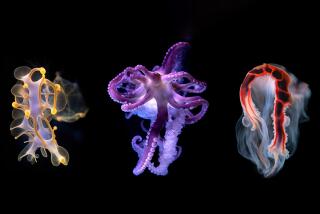Why the Arts Are Important to Science
Whatâs art got to do with it?
A lot more than people generally think.
To educators fighting over school budgets, art and music frequently are viewed as frills that drain funds from more serious subjects like math and science. But scientists and mathematicians know different. In fact, they often rely on aesthetics to guide their research, filter their perceptions and help them visualize patterns in the sometimes impenetrable chaos of data.
Thatâs why recent moves by Los Angeles and Orange counties to put the arts back into the schools is such good news for science education. Among the children who will benefit most are the future scientists and mathematicians--and the people who come to use their discoveries and inventions. Artistic training can sometimes play a critical role in scientific success.
Of course, scientists have long said that the best of their breed are artistically inclined. Most everyone has seen photos of Einstein with his violin and physicist Richard Feynman with his bongos. Iâve sat next to physicist Frank Wilczek while he played silent Bach piano concertos on his knees during professional talks. Nobel Prize-winning chemist Roald Hoffmann writes highly praised poetry (only sometimes about molecules).
Put four mathematicians in a room, the old saying goes, and youâre sure to have a string quartet.
In fact, artistically inclined scientists tend to win more awards than their less diversified colleagues, according to several studies. Michigan State University physiologist Robert Root-Bernstein and his psychologist mother, Maurine Bernstein, found that most Nobel Prize winners and members of the National Academy of Sciences had arts-related hobbies.
âTheir less successful colleagues did not share either their arts interests or their arts-related thinking skills,â the authors concluded.
This finding, replicated in several similar studies, seems a logical extension of other research conducted at UC Irvine suggesting that exposure to music actually enhances intellectual ability. Not only does listening to Mozart improve test performance (at least temporarily), preschoolers who play piano do better at science and math than their counterparts who donât.
Why should this be so? Why should painting or playing piano or writing poetry have anything to do with math or science? One obvious reason is that scientists, like artists, must learn to pay close attention--both to detail and to the broader context. Scientists, like artists, are people who notice things. They not only see things that other people often ignore, they also see the frequently hidden links among disparate aspects of reality.
*
Scientists and engineers, says Root-Bernstein, âmust learn to observe as acutely as artists and to visualize things in their minds as concretely. They must learn to recognize and invent patterns like composers or poets . . . and play their high-tech instruments with the same virtuosity as musical performers.â
Another art-science connection may lie in the relationship between our hands and our brains. A new book by California neurologist Frank Wilson, âThe Hand: How It Shapes the Brain, Language and Culture,â argues that people who use their hands are privy to a way of knowing about the world inaccessible to those not schooled in manual arts.
Speaking on National Public Radioâs âAll Things Consideredâ recently, Wilson told of a car mechanic who got a call from a vice president at a big computer company, complaining that his MIT-educated engineers couldnât solve problems as well as the older engineers at the company. It turned out, Wilson said, that 70% of older engineers fixed their cars, and 20% had some experience with wrenches. Of the young hotshots, none had ever held a wrench. As a result, they werenât as good at understanding complex systems.
*
The handâs knowledge about the world, according to Wilson, actually teaches the brain new tricks. The handâs touching, exploring and manipulating can rewire the brainâs neural circuitry.
Finally, logic alone is sometimes insufficient to solve really complex problems. Even Einstein said that imagination was more important to a scientist than knowledge. Physicists on the forefront of discovery often talk about being guided by âsmellâ or instinct. They talk about the âaestheticâ appeal of ideas.
According to French physicist Henri Poincare, aesthetics was âa delicate sieveâ that helped scientists sort through the confusion of facts and theories. The physicist P.A.M Dirac observed: âIt is more important to have beauty in oneâs equations than to have them fit experiments.â
Painting, piano playing and poetry help put things in context, sharpen details, hone observations. They sort the essential from the peripheral, forge connections, find patterns and discover new ways of seeing familiar things.
These are exactly the tools any good scientist needs.
More to Read
The biggest entertainment stories
Get our big stories about Hollywood, film, television, music, arts, culture and more right in your inbox as soon as they publish.
You may occasionally receive promotional content from the Los Angeles Times.










